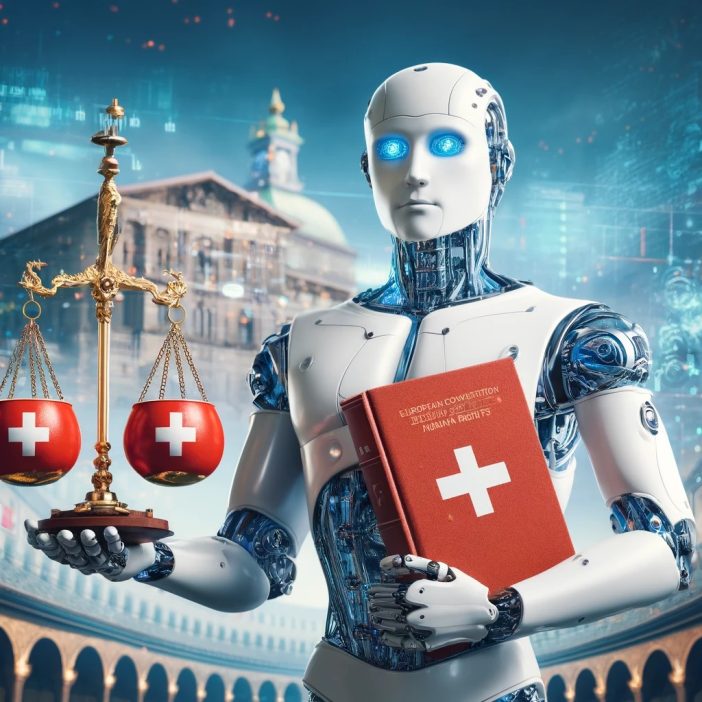Artificial Intelligence (AI) is a groundbreaking technology reshaping industries by enhancing how we communicate and innovate. Switzerland stands among the global leader in artificial intelligence (AI) and innovation, boasting the highest number of AI patents per capita and the most AI companies per citizen in Europe. Its top-tier research institutions, like ETH Zurich and EPFL Lausanne, further support the nation’s prominence in AI. ETH Zurich launched the ETH AI Center in 2020, enhancing interdisciplinary collaboration across business, politics, and society to foster innovative and trustworthy AI development. This intense focus on AI attracts significant tech companies like Google, IBM, and HPE to establish research bases in Switzerland. Additionally, the country leverages its expertise in life sciences to advance AI applications in healthcare and pharmaceuticals. However, using AI technologies in Switzerland has opportunities and significant legal challenges, primarily due to the country’s unique and evolving regulatory framework. This article delves into Switzerland’s AI regulations, exploring national and international guidelines and the practical considerations for businesses engaged in this transformative technology.
Overview of AI Regulations in Switzerland.
Switzerland’s approach to AI regulation is not consolidated into a single framework but is instead governed by various national and international laws. The Federal Constitution of the Swiss Confederation and the European Convention on Human Rights (ECHR) lay the foundational principles. In 2018, the Federal Council prioritized AI in its “Digital Switzerland Strategy,” which guides digital policy and informs actions across various sectors including government, business, and civil society. An interdepartmental AI working group was established, releasing a 2019 report that found Switzerland’s technology-neutral legal framework adaptable to AI without needing significant changes. Building on this, the group formulated AI usage guidelines for the Federal Administration in 2020, which were adopted in November, serving as a reference for federal agencies and their partners.
The “Digital Switzerland Strategy” sets the framework for the nation’s digital transformation, enforcing a “digital first” approach to improve citizen services and requiring Federal Administration compliance. Each year, the Federal Council identifies key focus themes; this year’s themes are cybersecurity, APIs, and AI regulation. By the end of 2024, Switzerland plans to introduce a specialized AI regulatory framework that aligns with sector-specific needs and international standards, particularly those of the EU and the Council of Europe. This effort aims to engage stakeholders in creating regulations that uphold human rights, democracy, and the rule of law while promoting national innovation and growth.
The Legal Challenges of AI in Switzerland.

Artificial Intelligence (AI) transforms our working methods, communicates, and fosters innovation. Nonetheless, adopting AI within business operations introduces various legal complexities and hazards. Some of these include data protection and compliance issues, adherence to competition fairness laws, intellectual property protections, and compliance with the European Union’s “AI Act.”
Data Protection Act and Compliance
The Federal Data Protection and Information Commissioner (FDPIC) insists on adhering to the Federal Data Protection Act (FADP) when using AI systems to maintain transparency about their functionality, data sources, and processing intentions. This transparency is crucial for safeguarding individual rights, including the ability to question automated decisions. It’s also mandatory for users to be informed about how their data is being used by AI systems, like intelligent language models, for various purposes including AI enhancement.
Additionally, processing personal data typically necessitates a Data Processing Agreement applicable to AI online tools. Therefore, companies must select AI tools that meet data protection standards. Tools such as ChatGPT Enterprise, Azure OpenAI Service, and Vertex AI are built to comply with these standards, facilitated by standardized data protection agreements.
Copyright Considerations
Copyright grants the owner specific exclusive rights over their work. For instance, under Swiss law, Article 10(1) of the Copyright Act (CopA) states that the copyright holder exclusively decides if, when, and how their work is utilized. Generally, any use impacting the copyright owner’s exclusive rights requires their consent. Therefore, AI applications that use copyrighted content for training must obtain permission or fit within specific legal exceptions. Legal actions can arise if AI providers use copyrighted material without consent, potentially leading to significant legal and financial consequences.
Fair Competition and Consumer Protection.
The Federal Act Against Unfair Competition (UCA) outlaws deceptive, misleading, or anti-competitive practices. Given the propensity of chatbots to produce inaccurate statements—a direct violation of this act—businesses are advised to place disclaimers prominently to address this issue. Moreover, when deploying chatbots or computer-generated images in marketing, it’s essential that their promotional nature is clearly disclosed. Ensuring these tools are identifiable as artificial is crucial to adhere to good faith principles and protect consumer autonomy, preventing any confusion about their authenticity and the reliability of their outputs.
The EU Artificial Intelligence Act (AIA).

The European Parliament adopted the AI Act on March 14, a pioneering legal framework for AI that will soon take effect. This Act aims to boost the internal market’s efficiency, foster human-centric and trustworthy AI, and safeguard health, safety, and fundamental rights as per the Charter of Fundamental Rights. It has extraterritorial implications, requiring compliance from Swiss providers and users if their AI systems are used in the EU or affect EU citizens. Exceptions are made for authorities operating under EU agreements.
The Act bans specific AI uses that risk citizens’ rights, including biometric categorization, mass facial image collection, emotion recognition in workplaces and schools, social scoring, predictive policing based on profiling, and AI that manipulates or exploits human behaviors. Consequently, Swiss AI providers developing products for the broader European market must adhere to these new standards, likely influencing Switzerland’s local regulations.
Conclusion
As AI continues to evolve, so does the legal landscape surrounding its use. Swiss businesses must navigate a complex framework of laws that have not yet fully adapted to the nuances of AI technology. By understanding and adhering to these regulations, companies can better position themselves to leverage AI technologies while minimizing legal risks and ensuring compliance across borders.
References:
Artificial Intelligence (admin.ch)
Switzerland Strategy – Digital Switzerland Strategy
09.11.2023 – Current data protection legislation is directly applicable to AI (admin.ch)
Switzerland tops global table for patents per capita – SWI swissinfo.ch
EU AI ACT https://www.euaiact.com/
Texts adopted – Artificial Intelligence Act – Wednesday, March 13 2024 (europa.eu)
Artificial Intelligence – Vischer
Please also see Part 3:  and Part 5:
and Part 5: 
And please follow me in:









This is a very interesting topic. There is a lot of mixed reactions surrounding AI. Despite the good and the bad people have accepted that AI is not just a phase but it’s indeed the future. It is therefore important to understand the laws and regulations governing it.